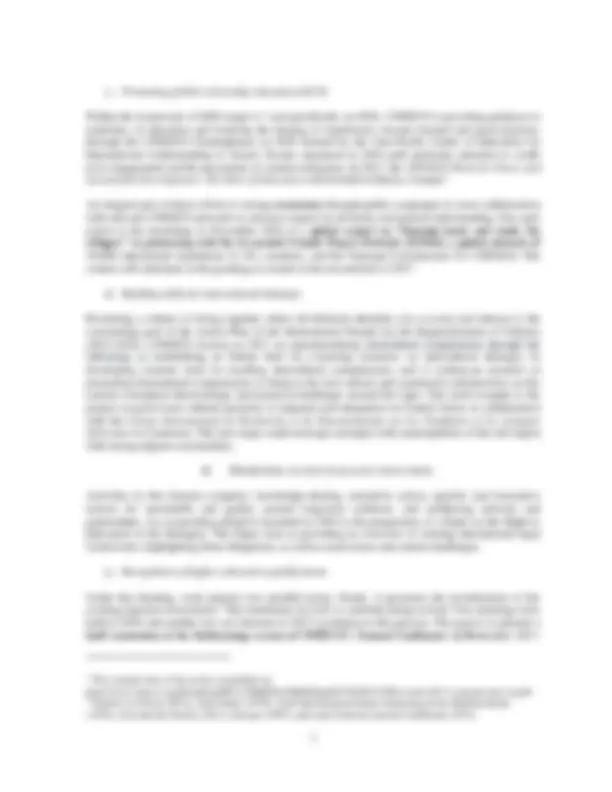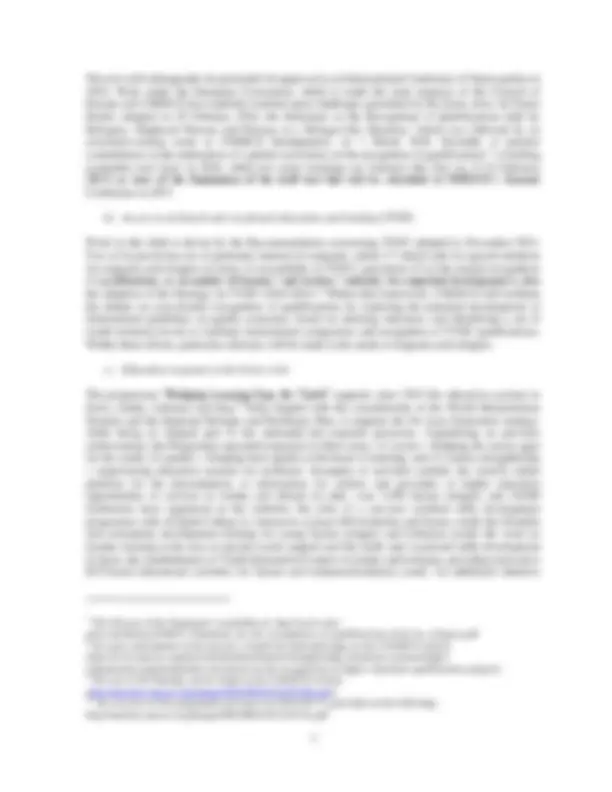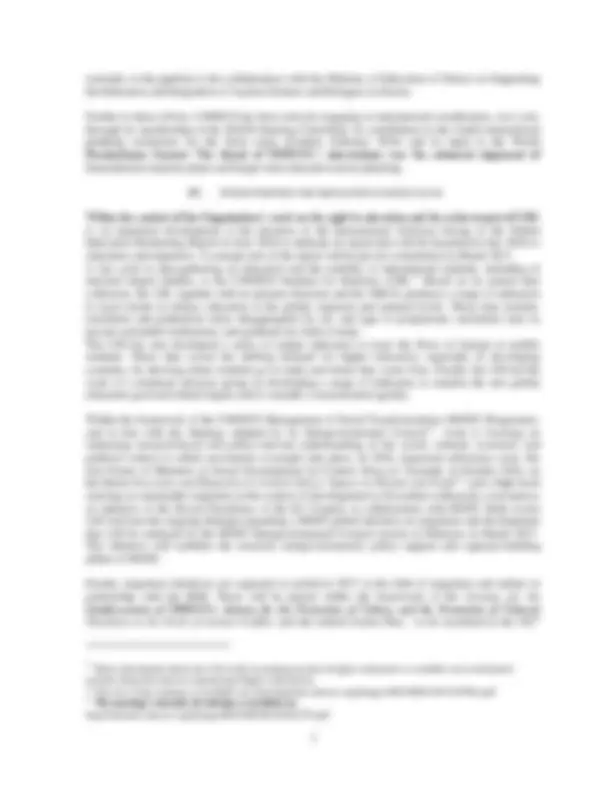





Study with the several resources on Docsity

Earn points by helping other students or get them with a premium plan


Prepare for your exams
Study with the several resources on Docsity

Earn points to download
Earn points by helping other students or get them with a premium plan
Community
Ask the community for help and clear up your study doubts
Discover the best universities in your country according to Docsity users
Free resources
Download our free guides on studying techniques, anxiety management strategies, and thesis advice from Docsity tutors
UNESCO's initiatives to promote inclusion and improve the lives of refugees and migrants through various programs. Topics include fostering a culture of living together, working with the media, and promoting global citizenship education. UNESCO also focuses on recognition of higher education qualifications and access to technical and vocational education and training.
What you will learn
Typology: Summaries
1 / 6

This page cannot be seen from the preview
Don't miss anything!




13 February 2017
Population Division Department of Economic and Social Affairs United Nations Secretariat New York, 16-17 February 2017
(^1) The views expressed in the paper do not imply the expression of any opinion on the part of the United Nations Secretariat.
The work of UNESCO on international migration extends across all its fields of competence – education, sciences, culture and communication. Broadly aligned to SDG 10, target 7 (“Facilitate orderly, safe, regular and responsible migration and mobility of people, including through the implementation of planned and well-managed migration policies”) and SDG 16 (“Promote peaceful and inclusive societies for sustainable development, provide access to justice for all and build effective, accountable and inclusive institutions at all levels”), it is underpinned by the ‘leave no one behind’ mantra of the 2030 Agenda for Sustainable Development. Within this framework, the following actions are undertaken:
I. FOSTERING A CULTURE OF LIVING TOGETHER
a) Promoting an inclusive urban governance for migrants
With SDG 11 and the New Urban Agenda as reference points, UNESCO is leveraging its International Coalition of Inclusive and Sustainable Cities − ICCAR to foster advocacy, awareness-raising and the sharing of experiences on addressing inter alia discrimination against migrants. 2 The latter commitment was underscored in the Bologna Declaration containing the outcomes of the ICCAR Global Steering Committee Meeting (April 2016).^3 In 2016, UNESCO launched, with the M. V. Vardinoyannis Foundation and the European Coalition of Cities against Racism, the "Welcoming Cities for Refugees: Promoting Inclusion and Protecting Rights" initiative. Its aim is to empower city administrations and other concerned stakeholders to apply, through policies and programmes, a welcoming urban governance agenda. A main output so far has been the publication of a study (entitled Cities Welcoming Refugees and Migrants ) presenting and analyzing main trends, issues and approaches with a focus on Europe, and also putting forward recommendations to foster the inclusion and improve the enjoyment of human rights by refugees and migrants.^4 In 2017, the partners place emphasis on the elaboration and pilot-testing of an operational handbook for city administrations and other concerned stakeholders. Similarly, grassroots research will be conducted in other regions to be followed by the design of appropriate tools for practitioners.
b) Working with the media for migrants’ inclusion
UNESCO’s approach is premised on the conviction that media should be an integral part of strategies dealing with refugee issues. The Organization’s action has two main components. The first focuses on addressing migrant and refugee-related narratives in the media. A roundtable was convened in March 2016 in Paris. The meeting recommendations informed the elaboration of two projects planned for 2017 and targeting Levant and North African countries respectively. Their aim is to promote a fair representation of refugees and migrants in media, and a better understanding between host communities and newcomers. The second component promotes improved access to information about the rights of refugees. In this respect, two projects involving the development of specialized live radio programmes were implemented in Lebanon and Jordan until early 2016.
(^2) More information on ICCAR is available on: http://www.unesco.org/new/en/social-and-human-
sciences/themes/fight-against-discrimination/coalition-of-cities/ (^3) The full text of the Bologna Declaration of the first ICCAR Global Steering Committee Meeting is available
on: 4 http://unesdoc.unesco.org/images/0024/002461/246194e.pdf The full text of the publication and an introductory video clip on the initiative are available on UNESCO website (http://unesdoc.unesco.org/images/0024/002465/246558e.pdf and https://youtu.be/sfLoZEKgdbA).
The text will subsequently be presented for approval to an International Conference of States parties in
b) Access to technical and vocational education and training (TVET)
Work in this field is driven by the Recommendation concerning TVET adopted in November 2015. Two of its provisions are of particular interest for migrants: article 27 which calls for special attention for migrants and refugees in terms of accessibility to TVET; and article 42 on the mutual recognition of qualifications, as an enabler of learners’ and workers’ mobility. An important development is also the adoption of the Strategy for TVET (2016-2021).^9 Within that framework, UNESCO will facilitate the debate on cross-border recognition of qualifications by exploring the potential development of international guidelines on quality assurance, based on learning outcomes, and identifying a set of world reference levels to facilitate international comparison and recognition of TVET qualifications. Within these efforts, particular reference will be made to the needs of migrants and refugees.
c) Education response to the Syria crisis
The programme “Bridging Learning Gaps for Youth” supports since 2015 the education systems in Syria, Jordan, Lebanon and Iraq.^10 Fully aligned with the commitments of the World Humanitarian Summit and the Regional Refugee and Resilience Plan, it supports the No Lost Generation strategy, while being an integral part of the nationally-led response processes. Capitalizing on previous achievements, the Programme upscaled responses in three areas: (1) access – bridging the access gaps for the youth; (2) quality – bringing back quality at the heart of learning; and (3) system strengthening
(^7) The full text of the Statement is available on: http://www.enic-
naric.net/fileusers/LRCC_Statement_on_the_recognition_of_qualifications_held_by_refugees.pdf (^8) For more information on the process, consult the dedicated page on the UNESCO website
(http://www.unesco.org/new/en/education/themes/strengthening-education-systems/higher- education/recognition/global-convention-on-the-recognition-of-higher-education-qualification-project/) (^9) The text of the Strategy can be found on the UNESCO website
( 10 http://unesdoc.unesco.org/images/0024/002452/245239e.pdf ). An overview of the programme activities for 2016-2017 is provided on the following: http://unesdoc.unesco.org/images/0024/002443/244333e.pdf
currently in the pipeline is the collaboration with the Ministry of Education of Greece on Supporting the Education and Integration of Asylum Seekers and Refugees in Greece.
Further to these efforts, UNESCO has been actively engaging in international coordination, inter alia , through its membership of the RACE Steering Committee, its contribution to the fourth international pledging conference for the Syria crisis (London, February 2016) and its input to the World Humanitarian Summit. The thread of UNESCO’s interventions was the enhanced alignment of humanitarian response plans and longer-term education sector planning.
III. STRENGTHENING THE MIGRATION EVIDENCE BASE
Within the context of the Organization’s work on the right to education and the achievement of SDG 4, an important development is the decision of the International Advisory Group of the Global Education Monitoring Report in June 2016 to dedicate its report that will be launched in late 2018 to education and migration. A concept note of the report will be put for consultation in March 2017. A key actor in data-gathering on education and the mobility of international students, including of doctoral degree holders, is the UNESCO Institute for Statistics (UIS).^11 Based on its annual data collection, the UIS, together with its partners Eurostat and the OECD, produces a range of indicators to track trends in tertiary education at the global, regional and national levels. These data include: enrolment and graduation ratios disaggregated by sex and type of programme; enrolment rates in private and public institutions; and graduates by field of study. The UIS has also developed a series of unique indicators to track the flows of foreign or mobile students. These data reveal the shifting demand for higher education, especially in developing countries, by showing where students go to study and where they come from. Finally, the UIS led the work of a technical advisory group on developing a range of indicators to monitor the new global education goal and related targets and to consider a measurement agenda.
Within the framework of the UNESCO Management of Social Transformations (MOST) Programme, and in line with the Strategy adopted by its Intergovernmental Council 12 , work is focusing on enhancing research-based and policy-relevant understanding of the social, cultural, economic and political context in which movements of people take place. In 2016, important milestones were: the first Forum of Ministers of Social Development for Central Africa in Yaoundé, in October 2016, on the theme Insecurity and Migration in Central Africa: Impact on Women and Youth^13 ; and a high-level meeting on sustainable migration in the context of development in November in Brussels, convened as an initiative of the Slovak Presidency of the EU Council, in collaboration with MOST. Both events will feed into the ongoing dialogue regarding a MOST global initiative on migration and development that will be endorsed by the MOST Intergovernmental Council session in Malaysia in March 2017. The initiative will mobilize the research, intergovernmental, policy support and capacity-building pillars of MOST.
Finally, important initiatives are expected to unfold in 2017 in the field of migration and culture in partnership with the IOM. These will be placed within the framework of the Strategy for the Reinforcement of UNESCO’s Actions for the Protection of Culture and the Promotion of Cultural Pluralism in the Event of Armed Conflict and the related Action Plan - to be examined at the 201st
(^11) More information about the UIS work in tracking trends in higher education is available on its dedicated
website (http://uis.unesco.org/en/topic/higher-education). (^12) The text of the strategy is available on: http://unesdoc.unesco.org/images/0024/002439/243958e.pdf (^13) The meeting’s outcome declaration is available on:
http://unesdoc.unesco.org/images/0024/002464/246437F.pdf